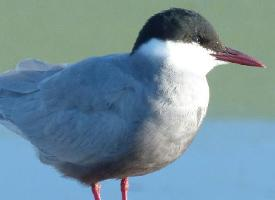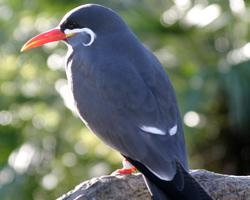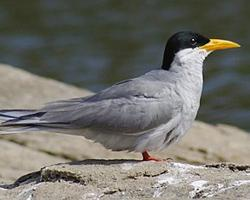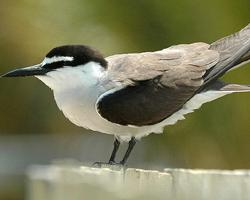
Veszélyeztetettség
| Veszélyeztetett |
Állatleírás
The Whiskered Tern (Chlidonias hybrida) is a captivating bird species that belongs to the tern family, known for its agility in flight and distinctive appearance. This medium-sized tern exhibits a unique blend of grace and precision, making it a fascinating subject for birdwatchers and ornithologists alike.Adult Whiskered Terns are characterized by their sleek, streamlined bodies that measure approximately 23 to 28 cm in length, with a wingspan ranging from 50 to 57 cm. They possess relatively short legs and a slender, pointed bill, which is predominantly black in color. One of the most striking features of the Whiskered Tern during the breeding season is its black head, which contrasts sharply with its white underparts. The back and upperwings are a beautiful grey, providing an elegant look to the bird. Non-breeding adults, on the other hand, display a white forehead and a more subdued greyish-brown coloration on the head and back, making them less conspicuous.
The "whiskered" moniker comes from the thin, white feather streaks that extend from the base of the bill to the back of the head, resembling a delicate set of whiskers. These are more prominent during the breeding season and add to the bird's distinctive appearance.
Whiskered Terns are highly adapted to a life spent predominantly in the air, with long, narrow wings that enable them to perform intricate maneuvers over water bodies while hunting for food. Their diet primarily consists of small fish, aquatic insects, and crustaceans, which they skillfully snatch from the water's surface or just below it, often without landing.
These terns are migratory birds, with breeding populations found across Europe and Asia, extending into parts of Africa. Their migration patterns are influenced by seasonal changes, prompting them to move to warmer regions during the winter months. Whiskered Terns typically breed in freshwater or brackish environments, such as lakes, marshes, and river deltas, where they construct floating nests from aquatic vegetation to lay their eggs.
Social creatures by nature, Whiskered Terns often form large flocks outside of the breeding season, where they can be seen engaging in communal roosting and foraging activities. Their vocalizations include a sharp, piercing "kik" sound, which is commonly heard during interactions with other terns or while in flight.
The conservation status of the Whiskered Tern is currently listed as Least Concern by the International Union for Conservation of Nature (IUCN), indicating that the species is not currently facing any significant global threats. However, like many wetland-dependent species, they are susceptible to habitat degradation and loss, pollution, and changes in water levels, which could impact their populations in the future.
In summary, the Whiskered Tern is a remarkable bird, embodying the grace and agility that terns are celebrated for. Its distinctive appearance, fascinating behaviors, and adaptability to different aquatic habitats make it a notable species within the avian world.
Hasonló állatok
Új állatfotók
Top 10 állat
- Dolphin gull (Leucophaeus scoresbii)
- Japanese macaque (Macaca fuscata)
- Stone loach (Barbatula barbatula)
- Russian tortoise (Testudo horsfieldii)
- Galápagos tortoise (Geochelone nigra complex)
- Greek tortoise (Testudo graeca)
- Diana monkey (Cercopithecus diana)
- Common flying dragon (Draco volans)
- Moustached guenon (Cercopithecus cephus)
- Galápagos penguin (Spheniscus mendiculus)


